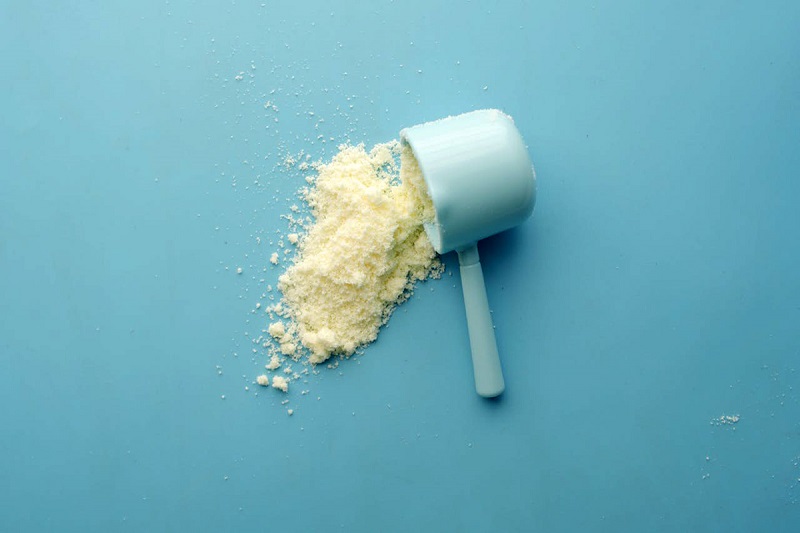Colostrum is the newest trend in a long line of powders and supplements that wellness influencers are adding to their morning protein shakes (see also: charcoal, collagen, and Athletic Greens).
When people first started to ask me about colostrum, I thought the questions related to human colostrum, which is the first, early, milk produced after a baby is born that lasts three to five days, before transitioning to the later milk. It’s a fascinating substance (although probably not all it’s claimed to be) but is also not in very ample supply, so I was confused about how people were getting enough of it to add to their shakes. Of course, it turned out to be bovine colostrum, which made more sense (cows are larger than people).
Bovine colostrum is what it sounds like: colostrum from a cow. Bovine colostrum supplements are generally powdered forms of cow’s early milk. They can be taken straight as supplements or incorporated into protein powders.

If you believe Instagram and TikTok, bovine colostrum is pretty magical. Its evangelists claim it produces better gut health (of course!) along with recovery, immunity, and energy improvements. Also, apparently it fixes bald spots.
So is social media true (on this particular point), or is it a load of bovine manure?
I am especially interested in this one, since one of the most widely claimed benefits of bovine colostrum is improved athletic performance. Although I am extremely skeptical of supplements in general, I am also willing to do almost anything if I think it will help me run even a tiny bit faster. What I am saying is: I’m ready to give this one a fair shake.
What exactly is in this stuff?
Cow colostrum has many similarities to cow’s milk. However, colostrum is more concentrated and, per unit, has more protein, more immunoglobulins (antibodies), more vitamins, more growth factors (cell-stimulating proteins), more minerals, and so on. For example: it’s about 15% protein on average, versus an average 3% for milk. It has more than twice as much calcium per weight and much more vitamins D and B12 (again, per weight).
Broadly, the claims about possible health benefits derive from a belief that these components — the immunoglobulins, the growth factors, etc. — are good for human health.
Bovine colostrum and athletic performance
Whether bovine colostrum improves your athletic performance has been studied in endurance athletics, especially cyclists. Exercise scientists like to study cycling because it’s easy to measure performance very precisely (with power and watts). Many papers on various topics begin with something like “Using a cohort of 16 elite male cyclists…” There is also a lot of incentive here, because cycling is a sport with money in it, where small changes in performance can mean the difference between success and failure (this is why they do over-the-top things like carbon monoxide microdosing, but that’s for another day).
In the case of bovine colostrum, we have a few studies that suggest, if you squint, small improvements in performance. This paper (“Twenty-nine highly trained male road cyclists…”) found various changes in the bovine colostrum group (things like a smaller post-exercise decrease in cytotoxic T cells), but many parameters were unchanged. The authors also found that the bovine colostrum group was less likely to have an upper respiratory infection, although this result was not significant.
A second study with this same cohort looked directly at performance and found the colostrum group had a 2% performance increase in their time trial after supplementation. On the flip side, a study of swimmers found no performance impacts.
This is really not enough data to say anything conclusive about performance (the same conclusion a review article came to). The effects seem to be small, and they are inconsistent across studies. In general, these studies are looking at many different biological measures; this raises a concern about “p-hacking” — basically, if you run enough tests, you’ll find something significant just by chance.
Research on athletes has also looked in a more focused way on intestinal permeability (“leaky gut”) and whether supplementation with bovine colostrum might improve gastrointestinal symptoms in athletes. (I am personally quite interested in this question) A review article from 2022 suggests that some biomarkers might be impacted by supplementation, but the approaches in the studies are all over the place, and some studies actually show that high doses make things worse.
None of this evidence is very compelling or precise. What we would need here to learn anything concrete is a much larger study, probably with more recreational athletes, with a variety of levels of supplementation and a defined set of outcomes. (For example: diary data on gastrointestinal symptoms, and a time trial testing on performance. If I were running this, I’d have people wear a Whoop tracker for recovery metrics.) In the absence of this, I think the best we can say is there might be some gastrointestinal benefits, and any impacts on performance are likely extremely small (if you want performance benefits, spend your money on super shoes instead).
Note: For the few people reading this who are in an elite athlete drug-testing pool, the World Anti Doping Agency warns against taking bovine colostrum because the IGF-1 factor could trip up a doping test.
Bovine colostrum and overall health
As noted, the internet is willing to attribute all manner of benefits to this substance. The data, not so much.
The one area with a little data is in improving gut health for people on longer-term doses of NSAIDs (aspirin, ibuprofen). These painkillers can cause gastrointestinal distress for some people, especially if they are taken for longer periods. One (small) study randomized individuals on longer-term NSAID doses into either a bovine colostrum group or a control group that got whey protein. It found that the colostrum was protective against that group’s measure of gut permeability.
Much of the other research here has focused on these gut questions. There is a bit of evidence on possible value for ulcerative colitis.
Together with the evidence in athletes, we start to get a picture of some possible positive impact on gut health. This somewhat aligns with some of the strongest evidence we see on the benefits of human breastfeeding (of human babies): reductions in gastrointestinal illness, especially in preterm infants.
There is plenty of other, speculative discussion about possible immune benefits from colostrum, but it’s all just that — speculative, possibly cell-based, small samples with unclear outcomes or implications. I guess it could be the fountain of youth, but you’d have to take that on faith, not data or any established science.
So here is the real question: will I try it? I’m torn! I do have a lot of exercise-induced gastrointestinal issues, so … I might.
The bottom line
- Bovine colostrum is what it sounds like: colostrum from a cow. Colostrum is the first, early, milk produced after a calf (or baby) is born. It lasts three to five days, before transitioning to the later milk, which is what we are typically drinking.
- There is some suggestive evidence that bovine colostrum could improve gut symptoms in athletes and people taking NSAIDs. More data would be necessary to learn more about this — whether it’s true, what doses, etc.
- There is no evidence for any other benefit of this supplement.

















Log in
What wasn’t mentioned (and what I have heard bovine colostrum used for) is to help with GI issues abroad (traveler’s diarrhea). It sounds like the evidence that was summarized would suggest it may be an effective treatment, but I’d be curious whether there are other studies on that application that were not included.
Came to ask this, travelan is basically colostrum in pill form that you take to prevent travelers diarrhea, and has some studies to back it up.